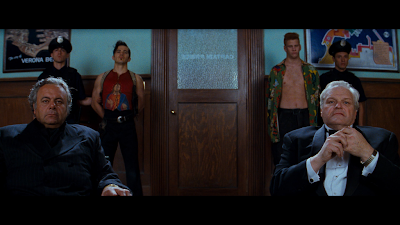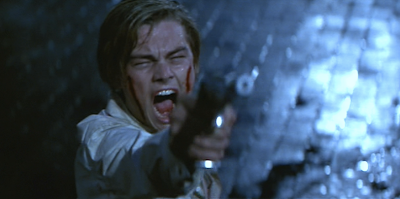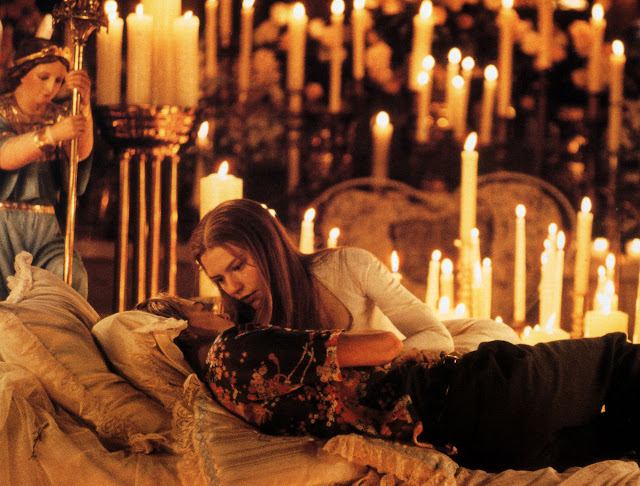Written by Leigh Kolb.
The opening scene of Baz Luhrmann’s William Shakespeare’s Romeo + Juliet is an intense display of masculinity. While in the original text the Capulet and Montague men draw swords and taunt one another, Luhrmann’s rivals pull guns, rev car engines, smoke, shoot, and light fire to gasoline.
Luhrmann’s 1996 film takes Shakespeare’s text–he stays truer to the language than other modern adaptations–and places it in a decidedly modern world of gang violence, guns, and ecstasy.
It’s Baz Luhrmann. It’s over-the-top and gorgeous, and perfectly encapsulates the timeless themes of the tragic story. At 15, audiences see violent action, young love (lust) and parents who just don’t understand. Older audiences, however, see a tragedy borne out of patriarchy and a culture that expects and respects traditional masculine power.
 |
| Capulet and Montague, business moguls and patriarchal forces. Jesus looks on. |
While Romeo’s Montague cousins are tied up fighting Capulets and taunting nuns, Romeo (Leonardo DiCaprio) is emoting on the beach over a recent breakup. His father references Romeo’s “tears augmenting the fresh morning dew,” and Romeo is seen smoking a cigarette, sweeping blond hair out of his eyes. Romeo doesn’t seem to be like his cousins, and even when they play pool together, he’s lamenting his lost love.
 |
| The feuding men. |
When he meets Juliet (Claire Danes) at her family’s costume ball, they are equally smitten and she is forward with her feelings–“you kiss by the book,” she says, as they attempt to escape her meddling mother (who’s attempting to set her up with Paris, played for laughs by Paul Rudd). In discussions about marrying off Juliet, her father indicates to Paris that while mothers are made at her age, it usually doesn’t bode well for a good life. Her mother–who knows her less than her nurse–seems to want to push her into marriage because she had to marry young. Her bitterness and desire to push Juliet into an arranged marriage and young motherhood is portrayed as villainous.
Luhrmann’s take on the balcony scene isn’t for purists, but it’s great for feminists. Instead of Juliet being separated from him on her balcony, elevated literally and figuratively as Romeo struggles to hang on, Juliet walks down to the pool as Romeo waits for her, and the two deliver their lines in the pool–on equal footing, intertwined.
 |
| A nontraditional balcony scene places Romeo and Juliet closer together. |
Juliet is continuously more mature than Romeo. While she falls for him as he does for her, she wants to know that he’s serious. Romeo stumbles, he’s clearly much more juvenile than Juliet is. They represent youth, yes, but also a departure from not only their fathers’ patriarchal social order and the gendered expectations placed upon them. Juliet’s world is protected and arranged for her; she’s expected to have a life like her mother’s (arranged and out of her control). Romeo’s effeminate nature goes against his father’s powerful corporate position and his cousins’ violent outbursts.
Romeo changes, however, when Tybalt (John Leguizamo) kills Mercutio (Harold Perrineau). Mercutio is frequently played flamboyantly–he doesn’t adhere to masculine norms and makes bawdy jokes at the expense of both Montagues and Capulets–and he represents a neutral party between the two families. Luhrmann’s Mercutio is played by a black man who convincingly cross-dresses for the costume party and attempts to bridge ground between the families. His death, then, is tragic to Romeo, but it’s also a sense of lost hope to the audience. Romeo gets behind the wheel of his car–he’s now part of this violent, masculine world–and chases after Tybalt. He maniacally shoots him as tears stream from his eyes.
 |
| When Romeo enters the violent, masculine sphere, the story changes completely and tragically. |
He drops the gun, and the rain that has been approaching finally falls.
This crisis is what leads to the couple’s downfall–Romeo stepping into the patriarchal, violent world of senseless feuds pulls him away from the feminine that he’d so willingly embraced and embodied before.
As Juliet’s father drunkenly promises his daughter’s hand in marriage to Paris, he’s surrounded by guns and mounted hunting prizes on the wall behind him. As Romeo and Juliet sleep upstairs, she, too, is being pulled into the patriarchal order against her will.
When Juliet first refuses, her mother turns away from her and her father throws her to the ground, screaming, “I give you to my friend.” Juliet sobs, begging her mother to delay the marriage–but she refuses, and walks away.
Even those closest to her betray her desires–Father Laurence (Pete Postlethwaite) and her nurse (Miriam Margolyes) encourage her to marry Paris.
Juliet goes to Father Laurence and holds a gun first to her head, and then points it at Father Laurence to prove her determination to not marry Paris. Juliet takes control, even when all is working against her. Juliet refuses to bend to the will of the men (and world-weary women) around her.
Noteworthy in Luhrmann’s adaptation is his profuse use of religious symbolism, specifically Catholic iconography. This is another set of patriarchal rules they live under. The images in the film have meaning but not depth; they are as threatening as they might be comforting. Jesus looms over the city (he’s under repair when Tybalt lies dead in the fountain below him). Christianity is present in the city, in Juliet’s room and around Romeo and Juliet’s necks, but it doesn’t save them.
The modernization of key plot points–the certified letter that wasn’t delivered, the dealer that supplies Romeo with poison (fetched from the base of a Virgin Mary lamp), Captain Prince surveying the city in a helicopter–work remarkably well. And the soundtrack–oh, the soundtrack.
In the original text, there is a span of time between Romeo’s suicide and Juliet waking to see him lying dead. Luhrmann plays this scene much more dramatically–she wakes as he’s about to take the poison, and in his shock his hand bumps it into his mouth. They are both alive for a moment, and she kisses him while he’s dying. The lack of bystanders or spectators in this scene makes it more powerful–even a Shakespeare purist could attest to that fact.
 |
| The death scene is altered from the original text, and adds to the emotional impact. |
Juliet shoots herself with no comment, and the camera pans up, looking at their dead bodies below while flashing back to moments of happiness.
Captain Prince screams “All are punished,” while their dead bodies are put into ambulances and the fathers look on bewildered.
In the original text, Friar Laurence gives a lengthy monologue, explaining all that had happened. Capulet and Montague shake hands and commit to peace.
In most Shakespearian tragedies, while there may be a pile of dead bodies at the end, there’s a sense of closure that things will be better in the future, or that the tragic tale will serve to teach others a lesson.
Not here.
There’s simply bewilderment, and the sense that the patriarchy, the violence, the incessant masculinity of Verona Beach has won, and everyone has lost because of it.
The story, then, isn’t about tragic young love. It’s about the tragedy of adhering to codes of behavior that are inherited and not freely chosen.
Luhrmann–by capturing a time and place that was at the same time specific and completely timeless–reminded a new generation of these messages that are as important and poignant today as they were in 1996, and as they were in 1595.
—–
Leigh Kolb is a composition, literature and journalism instructor at a community college in rural Missouri.


1 thought on “The Tragedy of Masculinity in ‘Romeo + Juliet’”
Comments are closed.